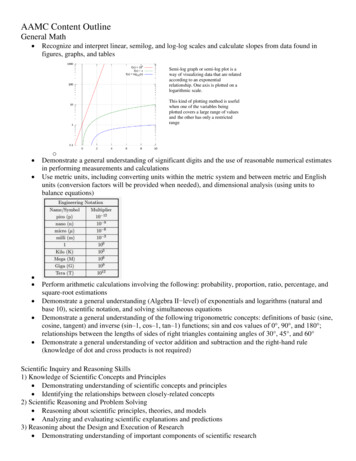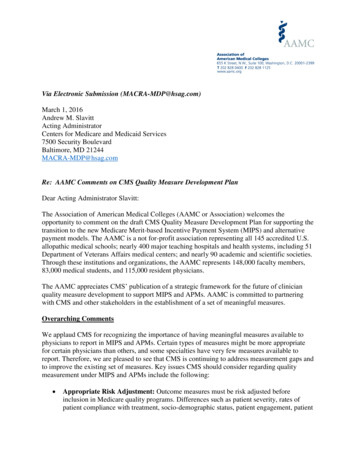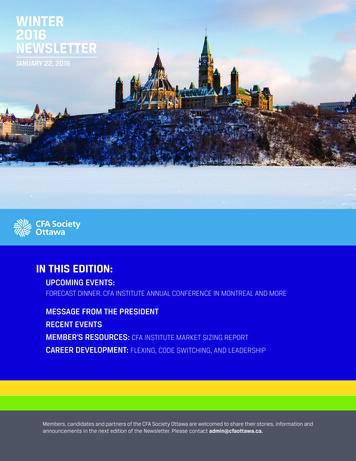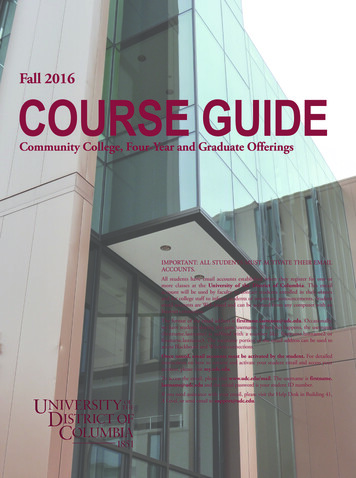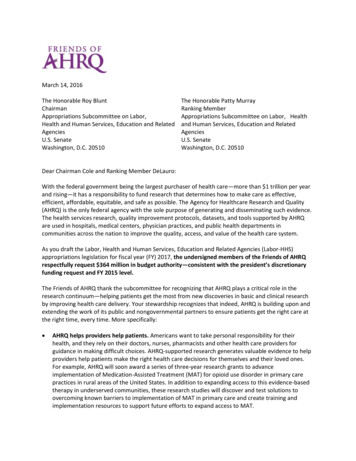
Transcription
March 14, 2016The Honorable Roy BluntChairmanAppropriations Subcommittee on Labor,Health and Human Services, Education and RelatedAgenciesU.S. SenateWashington, D.C. 20510The Honorable Patty MurrayRanking MemberAppropriations Subcommittee on Labor, Healthand Human Services, Education and RelatedAgenciesU.S. SenateWashington, D.C. 20510Dear Chairman Cole and Ranking Member DeLauro:With the federal government being the largest purchaser of health care—more than 1 trillion per yearand rising—it has a responsibility to fund research that determines how to make care as effective,efficient, affordable, equitable, and safe as possible. The Agency for Healthcare Research and Quality(AHRQ) is the only federal agency with the sole purpose of generating and disseminating such evidence.The health services research, quality improvement protocols, datasets, and tools supported by AHRQare used in hospitals, medical centers, physician practices, and public health departments incommunities across the nation to improve the quality, access, and value of the health care system.As you draft the Labor, Health and Human Services, Education and Related Agencies (Labor-HHS)appropriations legislation for fiscal year (FY) 2017, the undersigned members of the Friends of AHRQrespectfully request 364 million in budget authority—consistent with the president’s discretionaryfunding request and FY 2015 level.The Friends of AHRQ thank the subcommittee for recognizing that AHRQ plays a critical role in theresearch continuum—helping patients get the most from new discoveries in basic and clinical researchby improving health care delivery. Your stewardship recognizes that indeed, AHRQ is building upon andextending the work of its public and nongovernmental partners to ensure patients get the right care atthe right time, every time. More specifically: AHRQ helps providers help patients. Americans want to take personal responsibility for theirhealth, and they rely on their doctors, nurses, pharmacists and other health care providers forguidance in making difficult choices. AHRQ-supported research generates valuable evidence to helpproviders help patients make the right health care decisions for themselves and their loved ones.For example, AHRQ will soon award a series of three-year research grants to advanceimplementation of Medication-Assisted Treatment (MAT) for opioid use disorder in primary carepractices in rural areas of the United States. In addition to expanding access to this evidence-basedtherapy in underserved communities, these research studies will discover and test solutions toovercoming known barriers to implementation of MAT in primary care and create training andimplementation resources to support future efforts to expand access to MAT.
AHRQ keeps patients safe. The science funded by AHRQ ensures patients receive high quality,appropriate care every time they walk through the hospital, clinic, and medical office doors. AHRQ’sresearch provides the basis for protocols that prevent medical errors and reduce hospital-acquiredinfections (HAI), and improve patient experiences and outcomes. In just one example, AHRQ’sevidence-based Comprehensive Unit-based Safety Program to Prevent Healthcare-AssociatedInfections (CUSP)—first applied on a large scale in 2003 across more than 100 ICUs acrossMichigan—saved more than 1,500 lives and nearly 200 million in the program's first 18 months.The protocols have since been expanded to hospitals in all 50 states, the District of Columbia, andPuerto Rico to continue the national implementation of this approach for reducing HAIs. AHRQ makes the business case for high quality care. AHRQ helps health care providers – fromprivate practice physicians to large hospital systems – understand how to deliver the best care mostefficiently. For example, AHRQ maintains the National Quality Measurement Clearinghouse (NQMC)to provide health care providers, health plans, delivery systems, and others with an accessibleresource for quality measures and a one-stop-shop for benchmarks on providing more safe,effective and timely care. The breadth of evidence available from AHRQ empowers health careproviders to understand not just how they compare to their peers, but also how to improve theirperformance to be more competitive.The Friends of AHRQ appreciate that competing priorities abound and resources are increasingly scarce,and we recognize the importance of investing federal funds wisely. We urge you to restore the 30million cut AHRQ sustained in the Consolidated Appropriations Act of 2016 and provide the agency 364million in FY 2017, because it isn’t enough to develop cures. Understanding how to most effectively andefficiently deliver cures to patients through health services research is a critical component on thehealth research continuum, and one that has implications for health care quality, cost, access andultimately patient outcomes.We thank you for your consideration of our request and look forward to helping you preserve theagency’s unique role in generating evidence on the quality of health care and ensuring the evidence isused in practice. For more information, including a copy of our report, please contact Lindsey Horan at202.292.6718 or lindsey.horan@academyhealth.org.Sincerely,Academic Pediatric AssociationAcademy of Nutrition and DieteticsAcademy of Radiology ResearchAcademyHealthAdult Congenital Heart AssociationAlliance for Aging ResearchAmerican Academy of Dermatology AssociationAmerican Academy of Family PhysiciansAmerican Academy of Hospice and Palliative MedicineAmerican Academy of Otolaryngology—Head and Neck SurgeryAmerican Academy of PediatricsAmerican Association for Clinical ChemistryAmerican Association for Dental Research
American Association for Physician LeadershipAmerican Association for the Study of Liver DiseasesAmerican Association of Colleges of NursingAmerican Association of Colleges of Osteopathic MedicineAmerican Association of Colleges of PharmacyAmerican Association of Neuromuscular and Electrodiagnostic MedicineAmerican Association of Orthopaedic SurgeonsAmerican Association of Public Health DentistryAmerican Association on Health and DisabilityAmerican Board of Medical SpecialtiesAmerican Cancer Society Cancer Action NetworkAmerican College of CardiologyAmerican College of Occupational and Environmental MedicineAmerican College of PhysiciansAmerican College of Preventive MedicineAmerican College of RheumatologyAmerican Congress of Obstetricians and GynecologistsAmerican Gastroenterological AssociationAmerican Heart AssociationAmerican Hospital AssociationAmerican Medical Informatics Association (AMIA)American Medical Student AssociationAmerican Nurses AssociationAmerican Occupational Therapy AssociationAmerican Optometric AssociationAmerican Organization of Nurse ExecutivesAmerican Pediatric SocietyAmerican Pediatric Surgical Nurses AssociationAmerican Psychiatric AssociationAmerican Psychological AssociationAmerican Public Health AssociationAmerican Society for NutritionAmerican Society of HematologyAmerican Society of NephrologyAmerican Society of Pediatric NephrologyAmerican Society of Plastic SurgeonsAmerican Statistical AssociationAmerican Telemedicine AssociationAmerican Thoracic SocietyAssociation for Clinical and Translational ScienceAssociation of American Medical CollegesAssociation of Community Health Nursing EducatorsAssociation of Departments of Family MedicineAssociation of Family Medicine Residency DirectorsAssociation of Maternal & Child Health ProgramsAssociation of Medical School Pediatric Department ChairsAssociation of Population Centers
Association of Public and Land-Grant UniversitiesAssociation of Schools and Programs of Public HealthAssociation of University Radiologists (AUR)Association of Women's Health, Obstetric and Neonatal Nurses (AWHONN)Asthma and Allergy Foundation of AmericaBaylor Scott & WhiteBJC HealthCareBoston University School of Public HealthBrown UniversityCalifornia Consortium of Addiction Programs and ProfessionalsCedars-SinaiCenter for Healthcare Organizational and Innovation Research (CHOI Uc-Berkeley school of PublicHealth)Chron's and Colitis Foundation of AmericaCoalition for Clinical and Translational ScienceCoalition for Health FundingCoalition for Imaging and Bioengineering ResearchColumbia University Medical CenterCommissioned Officers Association of the U.S. Public Health Service, Inc. (COA)Conference of Boston Teaching HospitalsConnecticut Certification BoardConsortium of Social Science AssociationsDivision of Health Policy and Management, University of MinnesotaECRI InstituteEmory UniversityFederation of Associations in Behavioral and Brain SciencesFight Colorectal CancerGBS CIDP Foundation InternationalGlobal Healthy Living FoundationGroup Health CooperativeGuidelines International Network, North America Community Steering GroupHarvard UniversityHealthcare Information and Management Systems Society (HIMSS)Healthy Teen NetworkHIV Medicine AssociationIllinois Alcohol and Drug Dependence AssociationInternational Certification and Reciprocity ConsortiumInternational Society of Psychiatric-Mental Health NursesJohns Hopkins UniversityKaiser PermanenteLakeshore FoundationMarch of DimesMayo ClinicMedica Research InstituteMichigan State UniversityMinnesota Population Center (MPC)Muskie School of Public Service, University of Southern Maine
NAPHSISNASTAD (National Alliance of State & Territorial AIDS Directors)National Alopecia Areata FoundationNational Association of Nurse Practitioners in Women's HealthNational Athletic Trainers' AssociationNational Coalition for Hospice and Palliative CareNational Committee for Quality Assurance (NCQA)National Hispanic Medical AssociationNational League for NursingNational Partnership for Women & FamiliesNorth American Primary Care Research GroupNurses Organization of Veterans Affairs (NOVA)NYU Langone Medical CenterOncology Nursing SocietyOregon Health & Science UniversityPalo Alto Medical Foundation Research InstitutePediatric Policy CouncilPenn MedicinePenn State UniversityPhysician Assistant Education AssociationPopulation Association of AmericaPublic Health InstitutePulmonary Hypertension AssociationResearch!AmericaRTI InternationalRutgers, The State University of New JerseyRutgers-Robert Wood Johnson Medical SchoolScleroderma FoundationSociety for Maternal-Fetal MedicineSociety for Medical Decision MakingSociety for Pediatric ResearchSociety for Public Health EducationSociety for Women's Health ResearchSociety of General Internal MedicineSociety of Hospital MedicineSociety of Teachers of Family MedicineSumma HealthThe Children’s Hospital of PhiladelphiaThe Clinical Research ForumThe Integrated Health Interview Series (IHIS)The Joint CommissionThe Leapfrog GroupThe Marfan FoundationThe Society for Healthcare Epidemiology of AmericaThe Society of Thoracic SurgeonsTrinity Health-New EnglandTrust for America's Health
University of California, DavisUniversity of CincinnatiUniversity of Colorado, Anschutz Medical CampusUniversity of Illinois Hospital and Health Sciences SystemUniversity of MichiganUniversity of Missouri SystemUniversity of Nebraska Medical CenterUniversity of New Mexico Health Sciences CenterUniversity of North Carolina at Chapel HillUniversity of Pittsburgh School of MedicineUniversity of RochesterUniversity of South Dakota Sanford School of MedicineUniversity of South Florida HealthUniversity of WashingtonUPMC Community Provider ServicesUTHealth - The University of Texas Health Science Center at HoustonVanderbilt UniversityWake Forest Baptist Medical CenterWashington University in St. LouisWeill Cornell MedicineWestern Michigan University Homer Stryker M.D. School of MedicineWomenHeart: The National Coalition for Women with Heart Disease
Ranking Member Appropriations Subcommittee on Labor, Health and Human Services, Education and Related Agencies U.S. Senate Washington, D.C. 20510 Dear Chairman Cole and Ranking Member DeLauro: With the federal government being the largest purchaser of health care—more than 1 trillion per year


